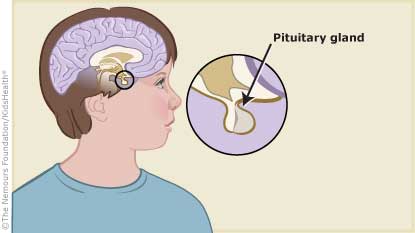Hypopituitarism is when the pituitary gland (a part of the brain) isn't working properly and doesn't make enough hormones (chemical messengers). Symptoms depend on which hormones are affected. They can include slowed growth, delayed puberty, problems controlling the amount of water in the body, and other problems. Treatments are available to treat most kinds of hypopituitarism (hi-po-peh-TOO-eh-teh-ri-zem).


Follow your health care provider's recommendations for:

Your child:
Follow your health care provider's instructions for specific reasons to call. For example, for some types of hypopituitarism, kids need treatment if their body is under stress (such as from an illness or injury).

What causes hypopituitarism? It can be congenital (meaning a child was born with it), or be due to an injury, an illness, or a growth (tumor). Sometimes it happens after someone is treated with radiation therapy for cancer or has brain surgery.
How is hypopituitarism treated? It is usually treated with hormone replacement medicine. Often, kids will need to take this medicine for a long time. This helps prevent serious health problems. If a tumor is causing the condition, surgery may help.